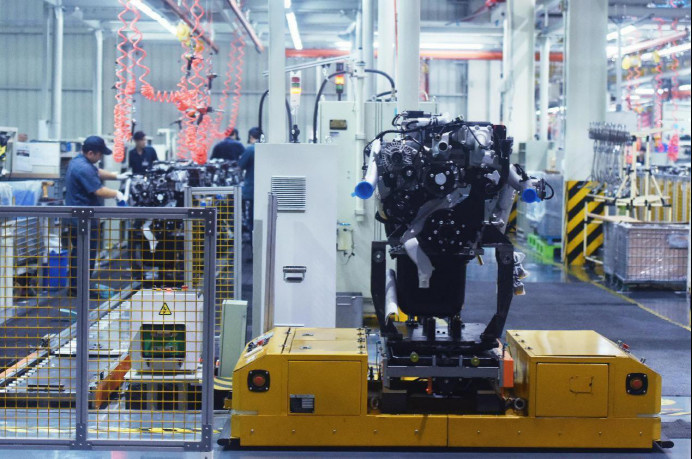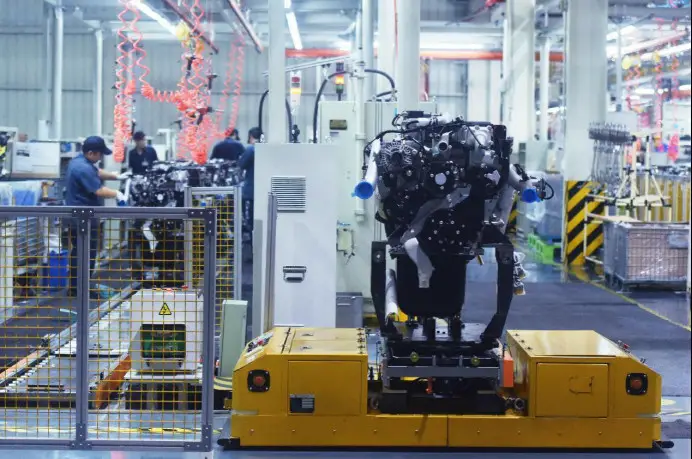By Jiang Nan, People’s Daily

An AI-powered robot carries a heavy truck engine at a factory of SINOTRUK Hangzhou Engine Co., Ltd. located in a robot manufacturing base in Xiaoshan Economic and Technological Development Zone, Hangzhou city, east China’s Zhejiang province, Oct. 18, 2021. (Photo by Long Wei/People’s Daily Online)
Thanks to a "smart brain" system, a garment company located in Hangzhou, east China's Zhejiang province is able to monitor its factory's production, real-time inventory and sales of its over 1,500 stores on the five screens it has set up at its exhibition hall. The results of its customer profile analysis are shown on the screens as well.
“The clothes currently on the production line will be sold in the next couple of days,” said a manager of the company.
"Consumer try-on and the deals they make generate big data information that helps us spot the hottest items, so we can soon ramp up production and destock," the manager said.
The manager told People's Daily that the company needs only two days to design a new sample shirt, while the process usually took a week in the past, thanks to the big data technology that enables it to intelligently mix and match over 30 kinds of collars and 50 types of cuffs.
This is an epitome of the prospering manufacturing sector of Hangzhou.
Hangzhou saw its manufacturing investment grow 48.7 percent year on year in the first quarter this year, the highest in nearly a decade. Meanwhile, the structure of the investment has been continuously optimized.
"The manufacturing sector receives the majority of the industrial investment in the city, and a large portion of the investment in the sector goes to the high-tech industry," said Lyu Mingzhong, deputy head of the industrial investment office, Hangzhou Municipal Bureau of Economy and Informatization.
The prioritized industries of Hangzhou, including computer, communications and other electronic equipment manufacturing, as well as other industries such as special equipment manufacturing and pharmaceutical manufacturing, all witnessed growth of over 90 percent in the first three months of this year.
It has become a consensus in Hangzhou that the upgrading of traditional industries should be further integrated with the development of emerging industries.
Hangzhou has drawn wide attention because of the fast development of its digital economy. The city is not only highlighted by its innovation in digital industrialization in software and information services, new internet business forms and electronic information, but also marked by its active exploration in the robotics, industrial Internet of Things, industrial brain, and enterprise cloud sectors. The city has paved a development path that integrates advanced manufacturing and modern service industries.
This has a close connection to a new manufacturing plan Hangzhou initiated three years ago, which specified that the city would pursue high-end, intelligent, green and service-oriented manufacturing.
The plan required the city to cultivate and introduce strategic emerging industries at a faster pace to transform and upgrade traditional competitive industries, and firmly rectify companies with low efficiency and poor management and eliminate backward production capacity.
As a result, social capital totaling tens of billions of yuan flew to the city's manufacturing industry.
Hangzhou is also subsidizing technical reform projects in the manufacturing industry that see over 10 million yuan ($1.47 million) of investment and strengthening its support for key areas such as new-gen information technology and its application, high-end equipment manufacturing, and biomedicine.
According to the plan, Hangzhou intends to transfer about 666.67 hectares of industrial land into manufacturing use every year between 2021 and 2023, and establish a 100-billion-yuan innovation fund to give full play to the role of the state capital and expand investment in life and health, artificial intelligence and other key industries planned by the city.
“The clothes currently on the production line will be sold in the next couple of days,” said a manager of the company.
"Consumer try-on and the deals they make generate big data information that helps us spot the hottest items, so we can soon ramp up production and destock," the manager said.
The manager told People's Daily that the company needs only two days to design a new sample shirt, while the process usually took a week in the past, thanks to the big data technology that enables it to intelligently mix and match over 30 kinds of collars and 50 types of cuffs.
This is an epitome of the prospering manufacturing sector of Hangzhou.
Hangzhou saw its manufacturing investment grow 48.7 percent year on year in the first quarter this year, the highest in nearly a decade. Meanwhile, the structure of the investment has been continuously optimized.
"The manufacturing sector receives the majority of the industrial investment in the city, and a large portion of the investment in the sector goes to the high-tech industry," said Lyu Mingzhong, deputy head of the industrial investment office, Hangzhou Municipal Bureau of Economy and Informatization.
The prioritized industries of Hangzhou, including computer, communications and other electronic equipment manufacturing, as well as other industries such as special equipment manufacturing and pharmaceutical manufacturing, all witnessed growth of over 90 percent in the first three months of this year.
It has become a consensus in Hangzhou that the upgrading of traditional industries should be further integrated with the development of emerging industries.
Hangzhou has drawn wide attention because of the fast development of its digital economy. The city is not only highlighted by its innovation in digital industrialization in software and information services, new internet business forms and electronic information, but also marked by its active exploration in the robotics, industrial Internet of Things, industrial brain, and enterprise cloud sectors. The city has paved a development path that integrates advanced manufacturing and modern service industries.
This has a close connection to a new manufacturing plan Hangzhou initiated three years ago, which specified that the city would pursue high-end, intelligent, green and service-oriented manufacturing.
The plan required the city to cultivate and introduce strategic emerging industries at a faster pace to transform and upgrade traditional competitive industries, and firmly rectify companies with low efficiency and poor management and eliminate backward production capacity.
As a result, social capital totaling tens of billions of yuan flew to the city's manufacturing industry.
Hangzhou is also subsidizing technical reform projects in the manufacturing industry that see over 10 million yuan ($1.47 million) of investment and strengthening its support for key areas such as new-gen information technology and its application, high-end equipment manufacturing, and biomedicine.
According to the plan, Hangzhou intends to transfer about 666.67 hectares of industrial land into manufacturing use every year between 2021 and 2023, and establish a 100-billion-yuan innovation fund to give full play to the role of the state capital and expand investment in life and health, artificial intelligence and other key industries planned by the city.
 Menu
Menu
 Hangzhou striving to make manufacturing more intelligent
Hangzhou striving to make manufacturing more intelligent
















